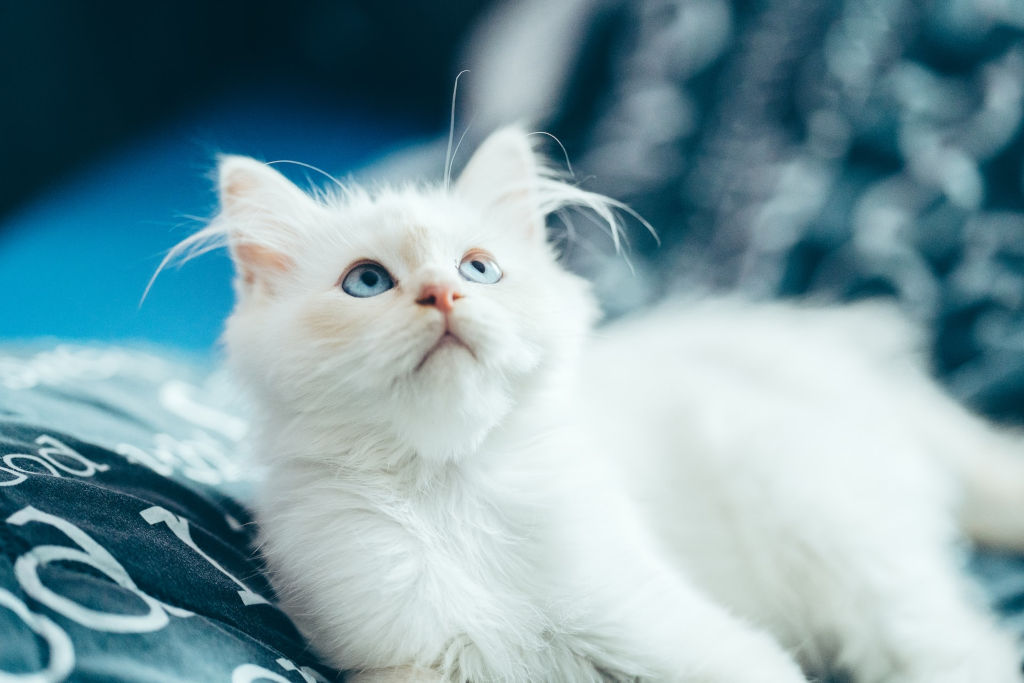Disclosure: We may earn a commission from helpful, relevant links in our content. No cost to you. See our privacy policy.
Introducing a common household item, baby powder, into your cat’s world can raise some concerns. But is it harmful to your feline friends?
In this article, we’ll explore the risks and precautions associated with baby powder and cats, as well as alternatives to keep your four-legged companion safe and healthy.

Is Baby Powder Safe for Cats?
While baby powder is not inherently toxic to cats, it is not recommended for use around them due to potential health risks.
When cats groom themselves, they may ingest the powder or inhale it, which can lead to respiratory issues or gastrointestinal problems. It’s essential to consider your cat’s safety and opt for cat-friendly products specifically designed for their needs.
Baby powder particles can linger in their fur even after grooming, leading to prolonged exposure and increasing the chances of ingestion or inhalation over time.
Many common household products have nuanced effects on cats, so it’s vital to stay informed and proactive, especially since felines often mask discomfort until it becomes more severe.
Risks of Using Baby Powder on Cats
Using baby powder on cats can pose several risks that pet owners should be aware of. Here are some potential hazards associated with baby powder exposure:
- Respiratory distress. Cats can accidentally inhale the fine particles of baby powder, leading to respiratory problems like wheezing, coughing, or even more severe issues such as asthma or lung inflammation.
- Gastrointestinal issues. Cats groom themselves by licking their fur, and they may inadvertently ingest baby powder. This can result in gastrointestinal discomfort, vomiting, or diarrhea, which can be harmful, especially for kittens or cats with pre-existing health conditions.
- Skin irritation. While baby powder is often used to soothe irritated skin in humans, it may cause adverse reactions in cats, such as itchiness, redness, or rashes. Prolonged exposure can disrupt the natural balance of oils on your cat’s skin, potentially leading to dryness or more chronic skin conditions.
Being mindful of these risks will help you make informed decisions about the products you use around your feline companion and ensure their health and comfort. Cats regularly face all sorts of health issues, there’s no need to add more by using inappropriate products.
How to Tell if Your Cat Has Been Exposed to Baby Powder?
You can detect baby powder exposure by observing your cat’s behavior and appearance.
Keep an eye on their breathing patterns for signs of respiratory distress due to inhaled powder, and monitor their grooming habits for excessive licking, particularly in areas where baby powder might have been applied.
It’s also important to inspect your cat’s fur for visible traces of powder and check their skin for any unusual signs like flaking, dryness, or inflammation.
Lastly, be attentive to your cat’s energy levels and demeanor, as a sudden change in their activity or unusual behaviors might indicate discomfort from baby powder exposure.
By focusing on these detection methods, you’ll be better equipped to identify whether your cat has come into contact with baby powder and take appropriate steps to address the issue.
Managing Baby Powder Exposure and Precautions for Cat Safety
In the event that your cat has been exposed to baby powder, it’s crucial to take appropriate action to minimize any potential health risks while also implementing precautions to keep your feline friend safe. Here’s how you can manage the situation:
First, if you notice visible traces of baby powder on your cat’s fur, gently remove it using a damp cloth or pet grooming wipes. Clean the affected areas thoroughly to minimize ingestion or inhalation risks.
Next, closely monitor your cat for any signs of worsening symptoms or discomfort, such as increased respiratory issues, skin irritation, or gastrointestinal problems.
If your cat shows signs of distress or their symptoms do not improve, it’s essential to consult your veterinarian for advice. They can guide you on the best course of action and, if necessary, provide treatment to alleviate any health issues related to baby powder exposure.
To prevent future incidents, ensure baby powder and similar products are stored securely out of your cat’s reach.
A good rule of thumb: treat baby powder like any other household chemical. Cats are naturally curious creatures; a little precaution goes a long way in avoiding any potential mishaps.
Additionally, consider using cat-safe alternatives specifically designed for their needs, such as grooming powders or sprays made for pets. By addressing any exposure promptly and taking preventative measures, you can help keep your feline friend healthy and comfortable.
Alternatives to Baby Powder for Cat Owners
As a cat owner, it’s essential to prioritize your pet’s safety and comfort. If you’re looking for alternatives to baby powder that are safe for your feline friend, consider the following options:
Cat-specific grooming powders
There are grooming powders on the market specifically designed for cats. These products are formulated to be safe and gentle on your cat’s skin and fur, ensuring their well-being while helping with grooming needs.
For example, you might try:
Pet-friendly deodorizing sprays
If you’re trying to address odors or freshen up your cat’s coat, look for pet-friendly deodorizing sprays. These sprays are designed to neutralize odors without causing irritation or harm to your cat.
Some popular options include:
Cornstarch
In some cases, you can use cornstarch as a natural alternative to baby powder. It can help absorb moisture and soothe irritated skin. However, use it sparingly and always monitor your cat for any adverse reactions.
Regular grooming
Regular brushing and combing can help keep your cat’s fur clean and free of tangles, reducing the need for additional products. Establishing a routine grooming schedule will benefit your cat’s overall health and well-being.
You might consider investing in a high-quality brush, such as:
By opting for cat-safe alternatives, you can ensure your feline companion stays healthy, comfortable, and well-groomed without risking exposure to potentially harmful substances.
Consult your veterinarian
If you’re unsure which products are safe to use on your cat or if they’re experiencing skin issues, it’s always a good idea to consult your veterinarian for advice. They can recommend suitable products or treatments tailored to your cat’s specific needs.
In addition, giving your cat an annual check-up is the best way to keep your companion consistently healthy.
FAQs
Is baby powder effective for treating cat fleas?
Baby powder is not an effective treatment for cat fleas. It’s better to use veterinarian-recommended flea treatments specifically designed for cats.
Why do cat groomers use baby powder?
Some cat groomers may use baby powder to absorb excess oils, reduce static, and help with grooming. However, it’s not recommended due to potential health risks for cats.
Can I use unscented baby powder on my cat without any risks?
Using unscented baby powder on your cat is not risk-free, as it can still cause respiratory issues, gastrointestinal problems, or skin irritation. Opt for cat-safe grooming products instead.
Alex, a passionate animal lover, has experience in training and understanding animal behavior. As a proud pet parent to two dogs and three cats, he founded AnimalReport.net to share insights from animal experts and expand his knowledge of the animal kingdom.




